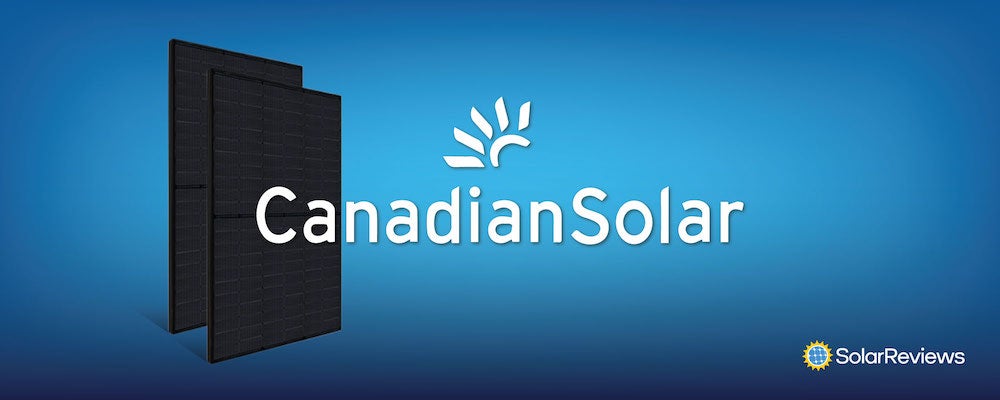
If you’re interested in going solar, chances are at least one of the installers you’ll talk to will offer Canadian Solar panels. As one of the top 5 solar panel manufacturers in the world, Canadian Solar has a long history of success and big plans for the future.
As one of the top 5 solar panel manufacturers in the world and one of SolarReviews’ best solar panel manufacturers for homeowners, Canadian Solar has a long history of success and big plans for the future.
Below, we’ll discuss how their solar panels compare to other top brands and whether you can trust them to last for multiple decades on your roof.
Why you can trust SolarReviews:
SolarReviews is the leading American website for consumer reviews and ratings of residential solar panels and solar panel installation companies. Our industry experts have over two decades of solar experience combined and maintain editorial independence for their reviews. No company can pay to alter the reviews or review scores shown on our site. Learn more about SolarReviews and how we make money.Key takeaways
- Canadian Solar is one of the 5 biggest solar panel manufacturers in the world, with 20 years in business, and SolarReviews has named the company the second-best solar manufacturer of 2023.
- The company’s residential solar panel lines are HiKu and HiDM, giving homeowners options in terms of performance and price.
- The HiKu product line is ideal for homeowners with limited roof space, since the panels have high-efficiency ratings. They also offer a better temperature coefficient.
- The HiDM solar panel line is cheaper than the HiKu line, they perform slightly less well in high temperatures and shaded conditions, and experience slightly faster performance degradation.
- Expect to spend about $17,000 to $20,000 for a typical 6 kW solar system that uses either of these Canadian Solar modules.
- The solar panel warranties offered by Canadian Solar meet or exceed the standard of the industry, and the company’s financial performance indicates they’ll be around to back those warranties up.
Find out if going solar is worth it where you live
About Canadian Solar
Canadian Solar Incorporated is one of the 5 largest solar module manufacturers in the world; as of late 2022, they had an annual production capacity of about 31 GW.
The company’s corporate headquarters is located in Guelph, Ontario, and they maintain a 500 MW manufacturing facility also in Canada. That said, the vast majority of Candian’s module manufacturing is done in China. In addition to the Chinese and Canadian facilities, Canadian Solar also manufactures various solar materials in Indonesia, Vietnam, and Brazil.
Canadian Solar was founded in 2001 by Dr. Shawn Qu, making it a relatively old solar manufacturer. It has since grown to employ thousands of people on several continents. The company is partially vertically integrated, meaning they not only make solar panels (also called ‘modules’), but also produce some of the raw silicon ingots, wafers, and solar cells that go into those panels.
Here’s a video of SolarReviews CEO Andy Sendy discussing how Canadian Solar fared in our ranking of the top solar panel brands:
Best Canadian Solar modules
As you might imagine with a company that has 20 years of solar manufacturing under its belt, Canadian Solar offers a large number of products.
The bread-and-butter of the company is its HiKu line, which comes in many varieties that can use either polycrystalline or monocrystalline silicon cells in configurations of 108, 120, 132, or 144 half-cells. For commercial and industrial markets, Canadian also offers a bifacial solar module called the BiHiKu.
For home use in the United States, Canadian offers two different product lines: HiKu and HiDM. Here’s some information about each of these products:
HiKu home solar modules
Canadian’s HiKu solar panels are their stock-standard offering.
Most models use industry-standard technology like half-cut monocrystalline PERC solar cells, but lower-cost modules also use polycrystalline cells. In fact, Canadian stands out for its continued use of poly cells, and they do a good job of making very high-quality modules using this relatively older technology.
Learn more: Polycrystalline vs. monocrystalline solar panels
There are three varieties of the HiKu product line: the HiKu Poly, HiKu Mono, and All-Black HiKu.
Base HiKu models for use in residential installations have model numbers that start with CS3 followed by a string of numbers and letters that correspond to the module’s wattage and cell type. For example, CS3L-360P is a 360-watt polycrystalline module, while CS3L-360MS is a 360-watt monocrystalline module.
The three varieties of Canadian’s HiKu product line. Image source: Canadian Solar
If roof space is at a premium, choose the mono modules, which have efficiencies up to 20.8% and can generate up to 385 watts in the same footprint as a poly panel, which maxes out at 370 watts. The mono modules also offer a better temperature coefficient, which means they’re better for hot climates (lower temperature coefficient means their energy output is reduced by smaller amounts as temperatures rise).
HiKu All-Black
If you demand an all-black solar panel, Canadian Solar has you covered, as it offers the HiKu in an All-Black version.
The only difference is the All-Black HiKu is slightly less efficient, because its non-reflective black backsheet causes it to retain more heat, and therefore causes the cells inside to produce less energy. Sure looks nice, though.
HiKu6
A newer version of the HiKu was introduced in early 2022. HiKu6 modules have model numbers that begin with CS6, followed by additional characters that describe the number of cells and wattage. For example, CS6R-420MS is a 420-watt module with 108 half-cut mono PERC cells.
HiKu6 modules come with standard aluminum frames and white backsheets in 395 to 420-watt power ratings, or in an All-Black version that can output between 380 and 405 watts, depending on the efficiency of the cells inside.
HiKu warranty
Canadian Solar’s HiKu line offers both product and performance warranties. The standard warranties include 12 years of protection against failures related to materials and workmanship, and a 25-year performance guarantee that the panels will make at least 98% of their rated power by the end of the first year, and degrade by no more than 0.55% per year until the end of the 25th year.
But wait, there’s more! Canadian Solar is now offering 25-year product warranties on select models. If you purchase a residential system in the U.S. after July 1, 2021 that uses monocrystalline HiKu modules with model numbers that start with CS3N or CS3W, you’ve got extra warranty coverage! Unfortunately, the HiKu6 maintains only 12 years of workmanship coverage in the US.
Read more here.
HiDM home solar modules
There are two varieties of Canadian Solar’s HiDM modules: the standard HiDM and the HiDM All-Black. Canadian’s HiDM solar modules are made in the company’s Korean factory using shingled, mono PERC solar cells.
The shingling means that the 60 cells can fit into a smaller area than if they were laid out with spaces between each one. These panels can be ideal for houses with small roofs, because they produce slightly more watts per square meter than HiKu panels.
HiDM panels come in standard and All-Black models. Image source: Canadian Solar
That said, HiDM modules tend to be a little cheaper per watt than Canadian’s other offerings. They perform slightly less well in high temperatures and shaded conditions, and also suffer slightly faster performance degradation than the HiKu modules.
HiDM warranty
Modules in the HiDM line come with both product and production warranties. Under the product warranty, you’ll be protected against defects in materials and workmanship for the first 15 years after installation.
The production warranty states that the HiDM panels will output no less than 97.5% of their original nameplate rating during the first year, and power output will decline by no more than 0.6% per year until the end of the 25th year.
These are fairly standard warranty numbers, with the 15-year product warranty being a bit better than the standard 12 years offered by most Tier 1 manufacturers.
Cost and availability
Canadian’s HiKu and HiDM solar panels come in at around the average price of Tier 1 solar panels. Expect to spend about $17,000 to $20,000 for a typical 6 kW solar system that uses these products, based on the current cost of solar panels nationwide.
That cost can change based on system size, your location, and the complexity of your roof, as well as the availability of solar incentives and rebates - find out which you are eligible for here.
Bottom line: Are Canadian Solar panels any good?
Canadian Solar makes excellent products and backs them up with warranties that meet or exceed the industry standard. The prices are competitive, and the company has a relatively long history of profitable operation, so you can be sure they’ll be around to back up those warranties.
A system that uses Canadian Solar panels is a good investment, in any state where solar panels make financial sense. If you’re ready to find an installer near you, start by using our free solar calculator to determine how much solar you’ll need for your specific home, and get cost and savings estimates.
